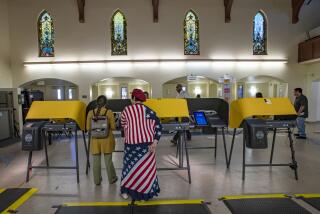Dear Letter-Writers: Someone Out There Really Is Listening
Two weekends ago at UC Irvine’s University Club, I dropped in on the 4th Annual Great American Write In, which was sponsored by a group called Women For: Orange County. Several dozen organizations representing a wide variety of causes were on hand with literature and representatives. They provided attendees with information on causes, which participants, in turn, translated into letters to their elected public officials.
It was a kind of shop-window democracy, and the whole scene was impressive. The weather was terrible, with pouring rain most of the morning, but the meeting was jammed with people, and it was sometimes hard to find a letter-writing spot at the several dozen large round tables provided for that purpose. The causes represented were heavily environmental, social, feminist and--for Orange County, anyway--liberal. The American Civil Liberties Union and Planned Parenthood were welcome guests here--but so were the Gray Panthers, the Laguna Greenbelt, the League of Women Voters, the Mental Health Assn. and Mothers Against Drunk Driving.
I shopped the tables and found that the hottest issues were Gov. Deukmejian’s dropping of family planning from his budget, the protection of choice for women in abortion, and the banning of the sale of semiautomatic guns. But there were also many letters being written on environmental issues (high school kids, who were well represented, were heavy in this area), more funding for mental health, attacking illiteracy, and providing shelter for the homeless.
The guest speaker was Anne Summers, the new editor of Ms. magazine, who came over from Australia when Rupert Murdoch bought Ms., then joined a group that recently bought the magazine from him. I was startled to find that Orange County’s reputation had even penetrated Australia.
Summers told me that she was “astonished” by this turnout since in her quarters, Orange County is seen “as a place of immense wealth and special conservatism. It’s marvelous to see that you have so many women here working for a better world.”
It was marvelous, but to a certified skeptic who has spent too many years hanging around power centers, the question kept intruding: Does all this energy translate into anything at the other end?
Since many of the letters were being sent to state Sen. John Seymour (R-Anaheim), I decided to call him and find out. The call turned out to be instructive.
Seymour said emphatically that letters from constituents are an integral part of the legislative process and an enormous help to him. He cited two areas in which constituent mail is especially effective: “Letters provide ammunition for me when I go to argue a position in committee meetings,” he said. “And if I haven’t made up my mind on how I’m going to vote, the mail is a tremendous help, especially on issues I don’t know much about. It makes a big difference.”
I asked him for examples of issues on which the mail had actually influenced his vote. He didn’t hesitate long. “When a California child goes to school, he is tested for curvature of the spine. A bill came before us that would allow chiropractors to perform this test. It was strongly opposed by medical doctors, and initially I agreed with the doctors and voted against the bill in committee. Then I learned from the mail that poured in that librarians and football coaches and school nurses are allowed to do this test, so I saw no reason why a chiropractor shouldn’t. I changed my vote as a result of that mail.
“I also changed my vote on a bill that required helmets for motorcyclists. I was against it 2 years ago and for it last year, mostly because of information contained in the mail I received.”
Seymour described almost lovingly the computer system that has been set up in his office to handle letters. “Every letter and phone call gets an answer,” he said proudly, “and often multiple answers. When the letter refers to specific legislation, we send progress reports to the letter writer as the bill moves. And when it is voted on, I tell them how I voted and why. I’ve had lots of letters back from people who didn’t agree with me but appreciated my follow-up.”
He said that another way the mail helps him is to give him varying points of view and their sources. “If I feel strongly about an issue,” he said, “I’ll look at a computer list of letter writers taking the other side. I’ll call several, ask why they feel that way and talk it over with them. This helps me clarify my thinking.”
Although Seymour insists he sees every letter that comes in, the one category that gets the least attention is mass-produced mail. He’s getting a fair amount of that--”18 inches of letters,” he says--on legislation now pending to ban the sale of assault rifles. He doesn’t know how the count is shaping up, but he does know that individually produced letters have the greatest impact on him.
And that’s the one piece of advice he would pass on to those who write their representatives in public office: “The letters that move me the most are those that are written in your own words in which you express what is clearly your own strong feelings. Those are the ones that cause the wheels to go around for me.”
I don’t think that the people writing letters so earnestly at the Write In needed to hear that. But I did.


